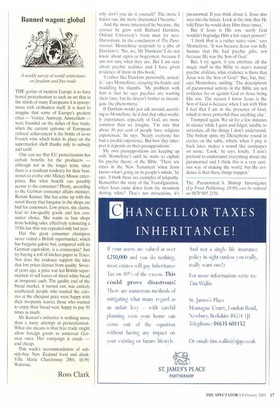Banned wagon: global
A weekly survey of world restrictions on freedom and free trade THE genius of modern Europe is to have honed protectionism to such an art that in the minds of many Europeans it is synonymous with civilisation itself. It is hard to imagine that some of Europe's greatest cities — Venice, Antwerp, Amsterdam — were founded on the riches of free trade, when the current epitome of European cultural achievement is the bottle of so-so French wine which holds its place on the supermarket shelf thanks only to subsidy and tariff.
One can see that EU protectionism has certain benefits for the producers — although not in the longer term, since there is a resultant tendency for their businesses to evolve into Mickey Mouse enterprises. But what benefit can possibly accrue to the consumer? Plenty, according to the German consumer affairs minister, Renate Kunast. She has come up with the novel theory that bargains in the shops are had for customers. Low prices, she claims, lead to low-quality goods and less consumer choice. She wants to ban shops from holding sales, effectively reinstating a I930s law that was repealed only last year.
Has this great consumer champion never visited a British supermarket, which has bargains galore but, compared with its German equivalent, is a cornucopia? Just try buying a roll of kitchen paper at Tesco. Nor does the evidence support the idea that low prices detract from quality. Several years ago, a price war led British supermarkets to sell loaves of sliced white bread at twopence each. The quality end of the bread market, it turned out, was entirely unaffected: people who wanted the calories at the cheapest price were happy with their twopenny loaves; those who wanted to enjoy their bread were happy to pay 50 times as much.
Ms Kunast's initiative is nothing more than a nasty attempt at protectionism. What she means is that free trade might allow foreign goods to undercut German ones. Her campaign is crude — and cheap.
This week's recommendation of subsidy-free New Zealand food and drink: Villa Maria Chardonnay 2001, £6.99, Waitrose,


























































 Previous page
Previous page